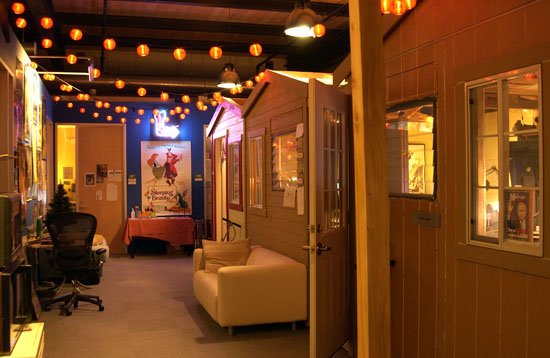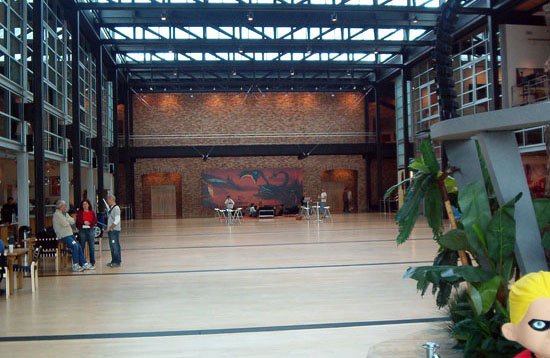How To Find And Live Your True Vocation
Reading time: 8 minutes
Woody, the famous moviestar from Toy Story. Image: coyot
What do you do when Steve Jobs is the owner of your company, but his presence during meetings is so overwhelming that it basically kills the flow of communication – and thereby the highly necessary creative process for said company? That was exactly the dilemma Edwin Catmull faced when Jobs bought his computer animation division from Lucasfilm back in 1986. In generalized terms, Edwin ‘permitted’ Steve to pay the salaries but asked him kindly yet urgently not to attend creative meetings anymore. Jobs agreed and in 1995 Toy Story became a huge box-office hit as the first fully computer-animated feature film ever to be released, putting Pixar Animation Studios firmly on the map.
The actual groundwork for what was to become Pixar can be traced back to 1974, but the seeds were planted much earlier than that. While growing up in 1950’s America, Edwin was enchanted by Disney animation classics like Peter Pan and Pinocchio. Consequently he wanted to become an animator, but since schooling opportunities in that field seemed non-existent, he chose a scientific career because of his innate talent for math and physics.
Soon, however, he became interested and involved in digital imaging, which was then still in its infancy. Cutting a long story short, while he lacked the schooling for imaging with a pencil, he nonetheless became one of those who wrote the book on digital imaging. Slowly a vision entered his mind, which was to become the first to release a completely computer animated feature film.
Everything he did from that moment onwards always carried that one intention, either overtly or covertly, and one could say that the stars aligned for him to become hugely successful with Pixar with the release of Toy Story. Yet I have a different opinion on that, because what I see in Edwin is someone who is living his true vocation: he combined his talents and innate abilities with something that he genuinely loved: animated movies depicting animated stories.
If you read his highly recommendable book ‘Creativity Inc.’ (which will also show you a rather underexposed side of Steve Jobs), you will find out how many hurdles he and his team had to overcome to finally reach success with Toy Story. Moreover, Edwin had to overcome many personal fears in the process. For example, while having no management experience whatsoever, he was confronted with the task of hiring a team (at NYIT) in 1974. One of the first people he interviewed was a Texan with a Ph.D. in computer science by the name of Alvy Ray Smith. During the interview Edwin felt uneasy in his gut because he thought Alvy was much more qualified – and consequently would take his job one day. Yet he hired him anyway on the premise of ‘when faced with a challenge, get smarter.’ A standout feature here is his tacit faith in fellow human beings, namely that Alvy wouldn’t go after his job. Since Edwin overcame his personal anxiety, a company culture arose based on mutual trust, respect, and not least, joy.
From the standpoint of balance, yinyang, or taiji, the way that Edwin and his associates ran Pixar (and later also Disney Animation Studios with his companion John Lasseter) was a phenomenal example of how to create a healthy, thriving, and most joyous working environment. This is aptly illustrated by the Pixar headquarters design. It was Steve Jobs’ philosophy that “if a building doesn’t encourage collaboration, a lot of innovation and the magic that is sparked by serendipity might be lost”, which is why the main building is specifically designed to encourage chance meetings and unplanned collaborations between people who in more conservative office buildings might never meet one another. As a result literally everyone at Pixar is involved in the movie making process, from the janitor up to the CEO, thereby creating an exhilarating, meaningful and satisfying workplace for all.[1]




Now an interesting question regarding someone like Edwin is: where did he get the energy to keep going on with the development of what would become Pixar all those years prior to its emergence and success? Where did he get the energy to overcome all the hurdles and anxieties that unavoidably had to be faced? The answer brings us back to the earlier observation of a human being who is living his true vocation: combining his innate talents with something he truly and genuinely loves. Yet how is it that a situation that encourages us to utilize our own unique talents on a daily basis, particularly when combined with something that is sincerely loved, seems to provide enough energy to move mountains?
The answer is as obvious as it is simple: using and developing our innate talents brings a genuine sense of meaningfulness to our lives, especially if we can combine them with something we truly adore and enjoy. Then, we move in the sphere in which our deepest motivations can be found, that which makes life worth living.
An widespread problem however is how to discover our innate talents and objects of love in a society where specialization, standardization and homogenization appear to be applied in pretty much every field. An important implication thereof is that many jobs become more and more monotonous and thus boring, lacking in meaning and definitely not making life worth living. Therefore a rapidly growing number of us need to find meaning outside of work, because we all know that without meaning life tends to become dull – and eventually unbearable.
Naturally, then, our current consumer-based society comes up with various objectives which pretend to provide meaning to an individual’s life, like success, fame, raising a family, being a good citizen, or consuming goods and services.[2] Yet while these suggestions might work for many of us on the conscious level, if they require different talents than the ones we’re born with, and if they are not our objects of love, they will never acquire a genuine sense of meaningfulness. It would be similar to convincing or compelling an apple tree into growing bananas; it doesn’t make sense and won’t make the apple tree happy because it’s not fit for that task. Therefore let us analyse how someone like Edwin found out about his innate talents and object of love, in order to give us some ideas on how we can find ours.
How many people are using their unique talents and innate abilities in environments like these? (image found at livecub.com)
If math and physics happen to be one’s innate talents, as they were in Edwin’s case, there is a good chance they will emerge during the school years. Every course which is part of a school curriculum offers opportunities to discover one’s talents if they are to be found there.[3] Obviously if one’s talents fall outside of school curricula, it becomes a bit more difficult. However, by observing children who are allowed to play and experiment with anything they can get their hands on, their innate talents will reveal themselves naturally. That is because when they are encouraged to play and experiment, their nature makes them experience what they’re good at – and what not. The first is fun to further develop, the second isn’t. That’s not different for adults.
Furthermore, how did Edwin find out about his love for animation? Well, next to his obvious love for the early Disney animation films, he actually produced animation making flip-books. So he became physically engaged with making animation products, even though their economic value was probably nil. That right there is one of the biggest signs that a love is sincere: when you become engaged with it for the sole reason of being engaged with it. When Edwin made those flip-books, I’m quite sure he wasn’t thinking about making money or how it would look on his resume. He was full of wonder about the magic of how flipping small sheets of paper with little drawings on them could actually create the illusion of a moving picture.
In short, if you wish to live your true vocation, or the most meaningful and happy life imaginable, you need to discover your unique, innate talents and your genuine object(s) of love.
In order to discover your innate talents, you need to find both a safe place and enough time to experiment doing things you think come naturally to you, without the anxiety of making mistakes, or worse, being punished when you make a mistake (actually, the making of mistakes ought to be a fun and informative part of your life experience anyway). Get out of your ordinary everyday structure for a while and become open to what you don’t know yet about yourself. Become familiar with your own body and how it reacts in different circumstances, which gives you infinite clues as to where your unique talents lie. Go and enjoy discovering your deeper layers and wonder about whatever emerges.
The minions of Pixar. Image: Kimulechka
Finally, your objects of love can usually be rather easily identified, because it’s those things you spend a lot of time on while generally not being of much financial or reputational value.[4] Then if you can use your unique talents to work with your objects of love, you become an unstoppable force; not because you’ve drunk some magic potion, but because you’ve tapped into the force of life itself by following the way of nature, which effortlessly makes every being do what it does and and be what it is.
To be sure, stepping on this path is definitely not the easiest road to travel. But since you’re already the hero of your unique story anyway, why not make the story as interesting and adventurous as possible?
Jolly discovering,
Erik Stout
[1] Their philosophy has a lot in common with the old Chinese wisdom of wúwéi (無為), which can be translated as ‘not to force things, but let everything unfold in its own pace’, thereby resembling the remarkable way nature works.
[2] From ‘The Anatomy Of Human Destructiveness’ by Erich Fromm.
[3] There are however no guarantees. If school achievements are average or bad due to a child growing up in a dysfunctional home where much energy is needed for mere physical survival and mental sanity, its talents can easily pass by unnoticed and remain unused.
[4] Of course there are countless objects people spend a lot of time on which are seen as vices, but don’t let that discourage you. Alan Watts states in his thought-provoking lecture The Spectrum Of Love that anything that is loved, whether regarded virtue or vice, is a form of the same energy. So if whatever you enjoy spending time on can be combined with your innate talents, then by all means don’t let anyone stop you.
If, however, whatever you spend a lot of time on is something that actually feels wrong to you, then go into the nature of it, research it, analyse it, meditate on it. If there is enough energy in you to spend so much time on something that actually feels wrong, then, according to Watts, you at least have the energy of Love available to you. Therefore he continues: “…you have to take it and let it grow where you find it. If you find that only one of these forms (of Love energy) exists in you, if at least you will water it, the rest of the plant will blossom as well.”





